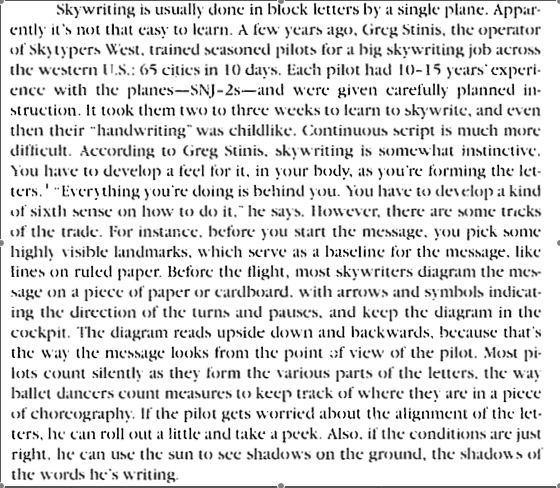“You have to develop a feel for it, in your body, as you’re feeling the letters. ‘Everything you’re doing is behind you.'”
 Dreaming of writing a breezy pocketbook bestseller called HOW TO HAVE FUN WITH CONTEMPORARY NONSENSE, I had my dream thankfully interrupted by the discovery of the mighty Ron Padgett’s Creative Reading (1997), which is sort of a better, richer, funnier, and broader version of my idea, involving a lot less instances of the phrase “Derridian play as model for invisible friendship” (yeah, I know, sorry in advance, hypothetical sorry, snow sorry, slur saw reed) and a lot more about how strange and terrific all reading can be. And how meeting up with that fact makes you a better reader and enables you to have fun with all kinds of reading, even the nonsense. Best of all, Padgett’s book is available for free by clicking the link above. It includes lots of great, clear and easy-gaited strategies for messing around with the stuff you read, which makes it an ideal text for teaching and/or quoting in the presence of family members who have no idea what the fuck you’re talking about, ever. It’s full of poems, tidbits, cut-ups, cool stuff. It’s basically about letting your mind be playful and less scared. Less scared of nonsense and of the nonsense at the root of language’s conceit, the ticklish arbitrariness of all abstract communication. Here is a blurb:
Dreaming of writing a breezy pocketbook bestseller called HOW TO HAVE FUN WITH CONTEMPORARY NONSENSE, I had my dream thankfully interrupted by the discovery of the mighty Ron Padgett’s Creative Reading (1997), which is sort of a better, richer, funnier, and broader version of my idea, involving a lot less instances of the phrase “Derridian play as model for invisible friendship” (yeah, I know, sorry in advance, hypothetical sorry, snow sorry, slur saw reed) and a lot more about how strange and terrific all reading can be. And how meeting up with that fact makes you a better reader and enables you to have fun with all kinds of reading, even the nonsense. Best of all, Padgett’s book is available for free by clicking the link above. It includes lots of great, clear and easy-gaited strategies for messing around with the stuff you read, which makes it an ideal text for teaching and/or quoting in the presence of family members who have no idea what the fuck you’re talking about, ever. It’s full of poems, tidbits, cut-ups, cool stuff. It’s basically about letting your mind be playful and less scared. Less scared of nonsense and of the nonsense at the root of language’s conceit, the ticklish arbitrariness of all abstract communication. Here is a blurb:
After a brief discussion of common reading errors that can be used creatively, the central chapter of the book, “Creative Reading Techniques,” suggests exercises that make reading an adventure, highly interactive, and imaginative, using both classic and modern literature in ways that blend reading and writing. Along the way, among other things, the book talks about the influence of typography, movies, and television on reading, the joys of misunderstanding, the music of Spike Jones, skywriting, Dada poetry, reading in dreams, the way words sound in the reader’s head, and the setting in which text is read.
There’s also an awesome appendix about skywriting. Tell me if this doesn’t remind you of anything:

